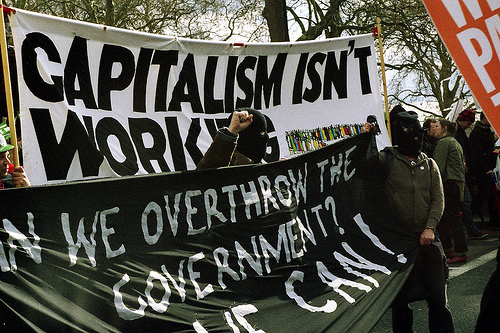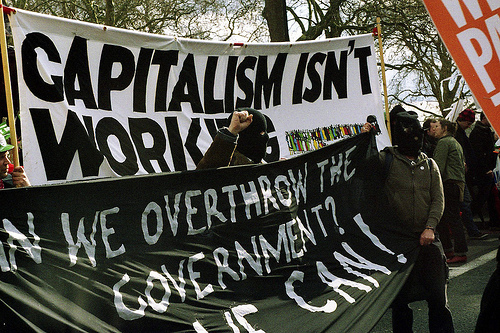by RogueOperator
What do a Nobel laureate, a Marxist, a debt-monger, a tax grabber, a Larouche Democrat, and a former Fed advisor have in common? No, this is not the set up to a bad joke (okay, maybe it is). The answer is: they were all slated to give economics lessons to the Occupy Wall Street zombies.
Those scheduled to present awere: Michael Abouzelof – Transnational Capitalist Class; Diane Sare – Glass-Steagall and the American system of credit; Justin Wedes – Tax havens; Christopher Rude – Capitalist production and finance: the difference between interest-bearing and fictitious capital; and David Graeber – Debt.
Why is this significant? According to released posts from a GoogleGroups forum bringing together the radical planners of Occupy Wall Street, these economists were slated to address the Open Economy Forum, which ultimately garnered noted economists Joseph Stiglitz and Jeff Madrick. The chanting drones echoing Stiglitz’ every utterance is must-see TV.
A glimpse at the background of these economic advisors shows them to be a motley crew, indeed.
Michael Abouzelof, an M.S. from The University of Utah, glows about Marxist analysis in his M.S. Thesis. A particularly important excerpt:
[Marx] was quick to point out that capitalism, defined by the anarchy of production and absence of centralized controls, lacked any sufficient mechanism to make sure these relationships were maintained. The necessary relationships would only be preserved by ‘accident’; any change in one of the main economic forces, such as changes in techniques or the rate of ‘profit,’ would ‘tend as a normal result to rupture of equilibrium.’ (54)
This is very salient passage that explains the disassociation in protesters’ minds between their advocacy of big government and their anarchist posture. Subscribing to Marx’s view that the natural state of capitalism is perpetual crisis (or “capitalism is the crisis” as one protester’s sign put it) with only temporarily “accidental” equilibrium, the protesters’ leadership exculpates government intervention as a cause of economic crises, and justifies both Fed intervention into the economy and government intervention more generally. On the other hand, Austrian theory, which is much more coherent and consistent in its explanation of economic crises, shows capitalist crises as a result of boom-and-bust periods, generally a result of centralization of banking and credit, and fluctuations in the money supply. This leads to malinvestment; distortion of the structure of the economy, as labor output is severed from popular demand; and sporadic and increasingly severe economic crises. (See the Mises Institute for more on Austrian economics.)
David Graeber is a well-known economist who has come out with the shopworn statist thesis that (public) “debt is good.” (Reminds me of a take off of on Dumb and Dumber “Debt is good, debt is gooooood.”) An article of his purports that the key to civilizational success is maintaining a lot of debt, and his implied argument is that the state should never repay it. His point of view was influential in terms of castigating those opposed to raising the debt ceiling without drastic cuts. He seems to carry the warped point of view that “capitalism” is whatever he chooses to define it; principally, that if banks and corporations get bailed out, that’s capitalism; and if they don’t, that’s capitalism too. If we have fiat currency, that’s capitalism, if we have the gold standard, that’s capitalism, if we have sacred property rights, that’s capitalism, if we have the state doing whatever it wants on behalf of businesses, that’s capitalism as well. This sort of intellectually disingenuous sophistry is rampant on the left; defining socialism narrowly that if a negative interpretation arises, it can be explained away or dismissed; and defining capitalism so broadly that a negative interpretation is inevitable. Regardless, Graeber is another apologist for the state doing whatever it wants in fiscal matters.
Justin Wedes is known for his satirical take on the amount of taxes corporations pay, advising them, through his website on how to pay “$0 in taxes and not help society.” Apparently all taxes help society and what corporations and businesses do doesn’t help the society through the productive economy. This sort of oppositional view of “society” versus “capitalist economy” is classic socialist thinking. But if we look past the point that corporations in the United States generally pay at least the second-highest corporate taxes in the world, and are double taxed beyond that, which corporations are not paying “their fair share”? Why, it’s Democrat-friendly corporations like Google, Microsoft, and General Electric, who zero out their taxes through a rigged tax code that considers 501(c)3 charities as anything that benefits the Democrat Party and the government in general. Therefore, the root of the problem is political corruption and overtaxation, which are both addressed by the Republican proposal of a flat tax. That is what “fairness” and “equality” means – everyone paying his share by equal percentage, and not disproportionately penalizing success. As it stands, even the AP admits that the rich pay their fair share. The top ten percent of income earners pay over 70% of the federal income taxes; 46% pay in the lower income brackets no such income taxes at all; and tax exemptions (or loopholes) are evenly distributed across the income spectrum.
Diane Sare is a “LaRouche Democrat” 2012 candidate for Congress in New Jersey. For anyone who doesn’t know, LaRouche is a Democrat front group that has even crashed the tea party with bogus racially charged signs. Sare advocates the reinstatement of the Glass-Steagall act, a favorite bogeyman for leftwingers to explain the mortgage crisis. Again, as if on cue, this view not only washes politicians’ hands of their role in causing the crisis through intervention into the economy, it actually blames “deregulation” and necessarily calls fro even more government intervention! (The causes of the mortgage meltdown are perhaps most succinctly and comprehensively addressed in Thomas Woods’ Meltdown.) The argument against Glass-Steagall is long and complicated, but hinges on the Rothbardian view of “free banking.” Without free banking, such a law as Glass-Steagall, which forbids consumer accounts banking from leveraging those assets for investment purposes, is at best a necessary evil. Since consumer accounts are “insured” by the FDIC, such a concoction of consumer banking and investment banking could lead to moral hazard, and the government being on the hook for poor investment choices. Which is exactly what we saw with TARP and the bank bailouts.
Finally, we have Christopher Rude, perhaps my favorite of the bunch. Dr. Rude was previously affiliated with the New School of Social Research, a notoriously left-wing university. Here is what Rude’s biography states:
Christopher Rude is a political economist with an interest in finance. He has a PhD in economics from the New School, where he specialized in development and macroeconomics, and a MA and BA in political science from the University of Chicago, where he studied American politics and state theory. He has taught economics at NYU and the New School and political science at York University in Toronto and worked as a consultant for the United Nation on the Asian crisis and the Friedrich Ebert Stiftung on the current economic crisis. Prior to his return to academia, Chris worked as an economist at the Federal Reserve Bank of New York and on Wall Street. His recent work has focused on analyzing the Federal Reserve and the IMF’s response to the global economic slowdown. He advocates a radical restructuring of both the US and the international financial system.
This is priceless. We have a former advisor to The Fed and Wall Street economist advising the occupiers how to “change” the international economic system. Added to this mix is the Nobel laureate in economics Joseph Stiglitz, an extremely influential Keynesian, that is, a big government economist. This is not to mention other numerous economic advisors, like the U.S. Solidarity Economic Network (SEN), which has a branch “SolidarityNYC.” Of course, this group has advocated “green jobs” as one financial solution, although those are notoriously wasteful and rife with corruption. Overall, we have statist economists seemingly parachuted in to steer the occupiers towards a “consensus” that we need more state intervention and control over the economy.
No, you Occupy Wall Street fellows aren’t useful idiots at all.
As posted on Political Crush.

